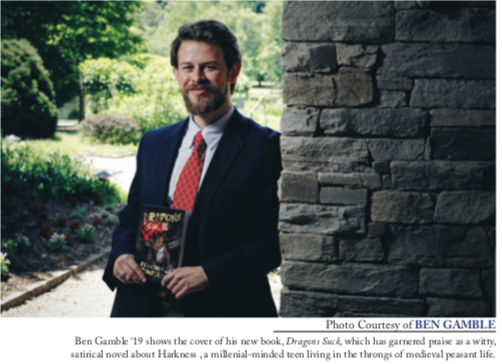Dragons Suck, by Ben Gamble, has gained a reputation as a “witty,” “satirical,” and “laugh out loud” adventure tale, according to reviews on Amazon. Gamble graduated from Furman in 2019; during his time at the University he double-majored in History and Spanish, forged deep connections in the Improv Club, became editor of the Echo and even participated in the Furman Futures Program. On (date you talked to Ben), I called Gamble to discuss his new novel.. As Gamble recounted the backstory of Dragons Suck—which he started as a senior in high school—his enticing storytelling abilities and wisecrack humor revealed the novel is more than an adventure story. Though certainly a good-natured jab at the modern teenager, Gamble believes the book can also be interpreted as a sort of redemptive story for millennials, one that defendssome of the “less-desirable” aspects of their reputation.
In other words, Gamble believes that today the term “millennial” has become synonymous with lazy, narcissistic, greedy and perpetually unsatisfied. Instead of dodging the negative labels being pelted at his own generation, however, Gamble embraces them. In both recognizing and accepting this criticism, Gamble creates a duality: an anti-fairytale fairytale.
The plot of Dragons Suck focuses on Harkness, a medieval peasant, and his journey to slay the dragon threatening his village. At first glance, it sounds like a typical tale from the Brothers Grimm… except Harkness has not volunteered for this quest out of bravery or courage. Instead, Harkness is a millennial-minded teen living in throngs of medieval peasant life. He only volunteered for this quest in hopes of embezzling the village’s money and ultimately leaving the town to suffer the wrath of the impending dragon attack. As Gamble puts it, “he begins as an unlikeable protagonist”—a common kid who gets roped into fulfilling a task he has no intent to complete; and that is the point.
Growing up with Harry Potter, The Hunger Games, and Star Wars, Gamble felt as though literature was portraying an idealistic image of teenagers that created inspiring, though unrelatable, stories. He wanted to craft a narrative that resonated with the everyday teen, and Dragons Suck is his attempt to do just that. Gamble explained that in his teens, he “certainly saw some of Harkness’ characteristics in himself.” Though he may have outgrown them now, he still seesthem as an inevitable stage of life. And, just as there is redemption in store for Harkness in the last chapters, Gamble too thinks he’s turned the page on his younger self.
While a medieval village might seem like an odd setting for a tale of millenial-heroism, Gamble chose it because, among other reasons, it helps emphasize that the negative characteristics attributed to the modern teen “aren’t solely unique to our generation.” In fact, he thinks they are recognizable at almost every stage of human existence. “In biblical times people melted gold rings to make a golden calf instead…tell me they weren’t looking for the perfect Instagram picture with that one,” Gamble joked.
Humorous and insightful—the same qualities his book is now praised for, Gamble rejects the notion that generations before were less, for lack of a better word, self-absorbed than his own. In sum, Dragons Suck both embraces and refutes millennial stereotypes, all while taking the reader on an adventure story unlike any before.




































